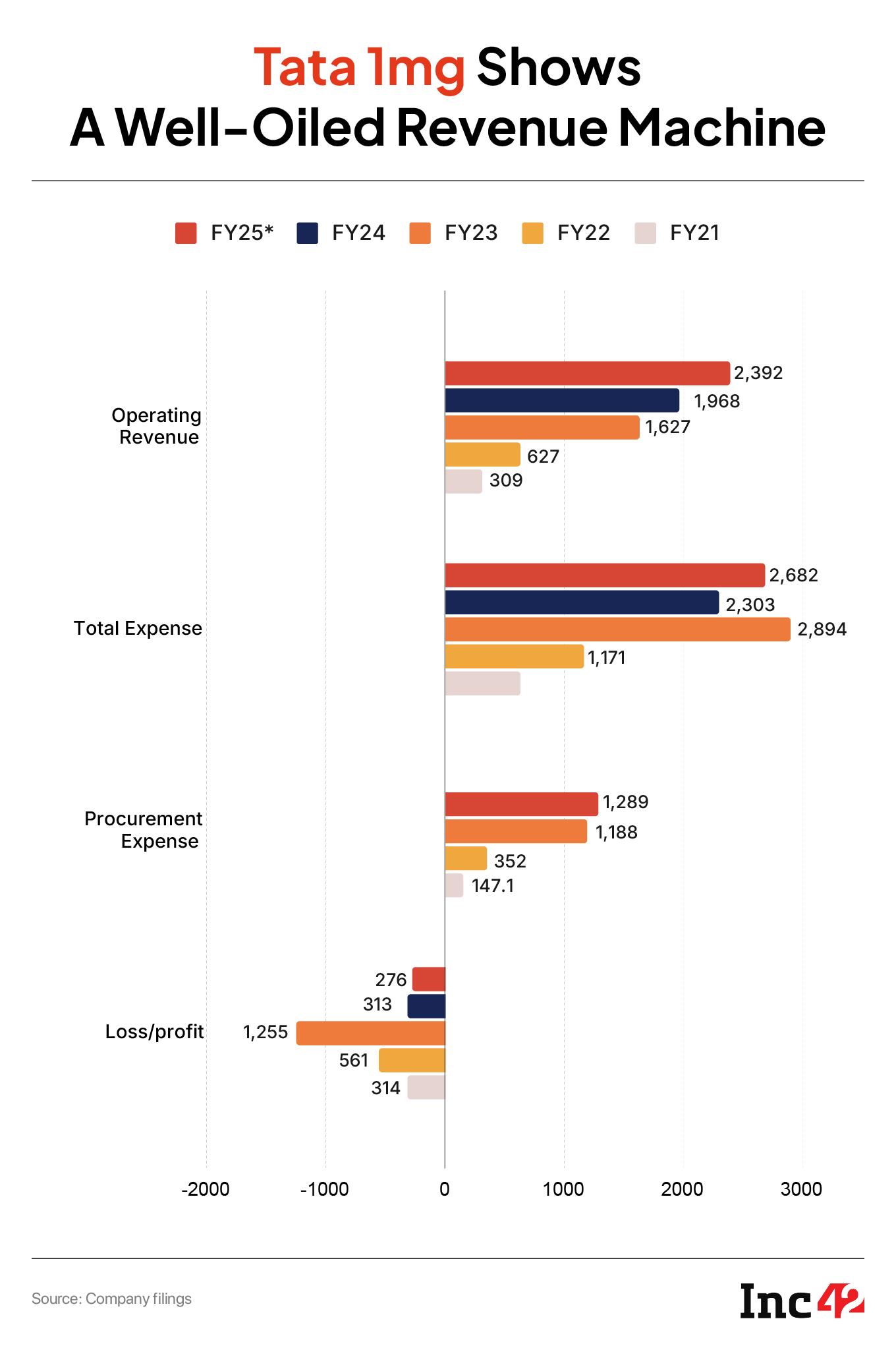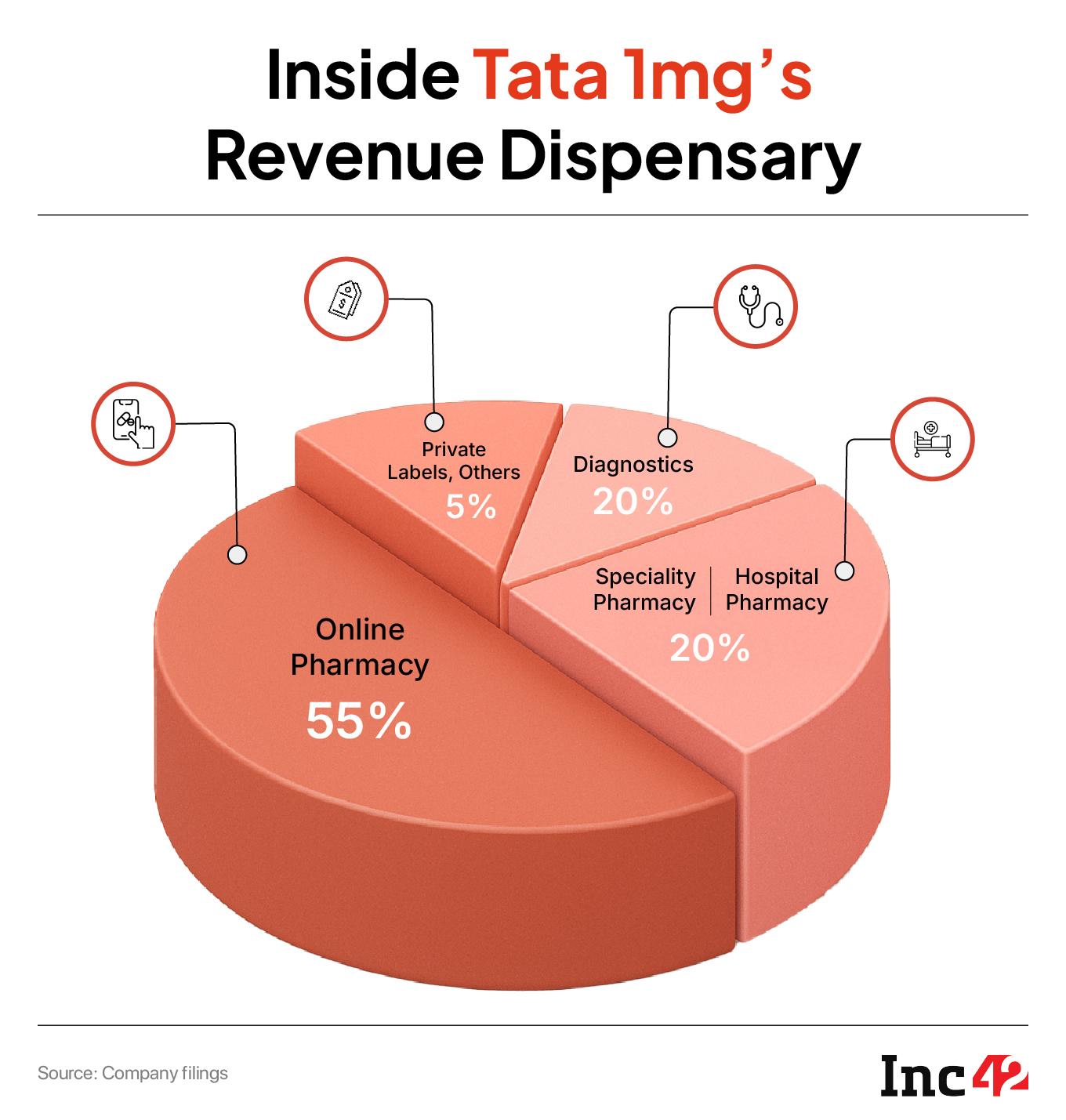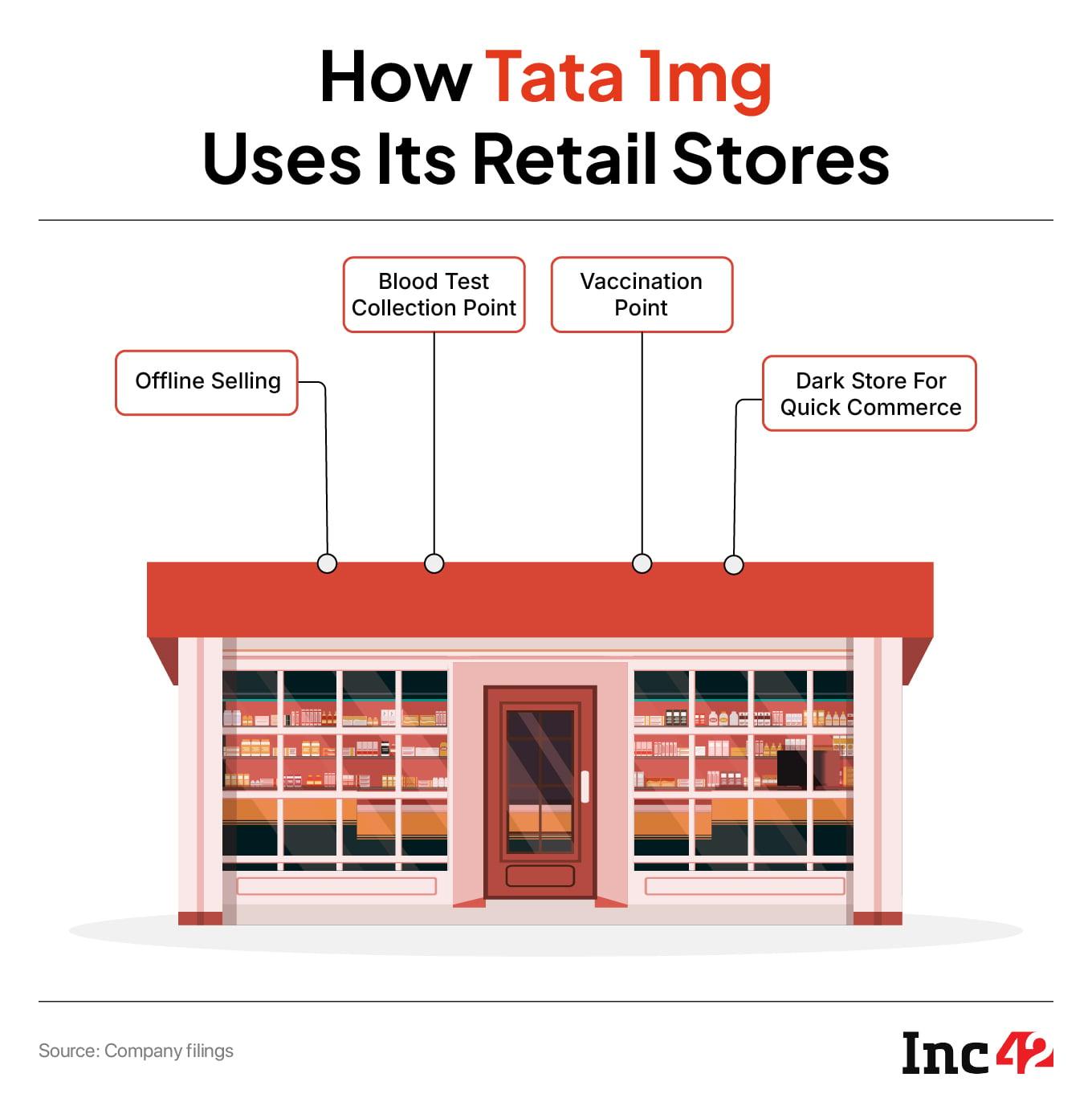Tata 1mg is shifting gears to become a full-stack healthcare service provider to offer everything from diagnostic services to e-consultations and medicines, both online and offline.
The healthtech startup is reportedly in advanced talks to raise around $200 Mn (INR 2,400 Cr) in yet another funding round. The round is said to have attracted interest from several new global investors, including Novo Holdings, the Canada Pension Plan Investment Board (CPPIB), Permira, and ChrysCapital.
The whispers of the new round have come at a crucial time for one of the earliest healthtech startups in India..
With this, the company now expects to rule the entire outpatient ecosystem, pushing it closer to breaching the INR 3K Cr revenue mark in FY26. In FY25, the startup posted a revenue of INR 2,400 Cr, up 22% year-on-year (YoY), and trimmed its loss 12% YoY to INR 276 Cr.
Focussed on tapping into India’s $38 Bn outpatient market, the company is aggressively positioning itself to lock horns with Apollo and Max — the two mavericks of this arena.
Now, before we immerse ourselves in understanding what aces does 1mg have up its sleeves and what its next phase of growth looks like, let’s trace the company’s journey from the start.
Early Days Of 1mgTata 1mg traces its journey back to 2012, when it was launched as Healthkart Plus, the content arm of Sameer Maheshwari’s HealthKart. However, little do people know that 1mg’s story closely mirrors Zomato’s early journey. How, you ask?
- Both Zomato and 1mg started under very different identities from what they are today. While Zomato began as FoodieBay (little known to date), 1mg was Healthkart Plus.
- Both started as a listing platform, before making an inevitable pivot to consumer-facing commerce
- While Zomato made Indians order food online, Tata 1mg did this for medicine.
To incorporate HealthKart, Prashant Tandon from McKinsey & Company joined hands with Maheshwari. While Maheshwari focussed on scaling HealthKart into a nutrition and health supplement platform, Tandon spearheaded HealthKart Plus, a content-driven platform that offered information on medicines, their salt composition, and substitute brands.
The platform, HealthKart Plus, quickly began attracting significant organic traffic, as users sought reliable information about their medicines.
“However, something was missing in the way we were doing things,” said Tandon.
The founder continued business as usual until 2015, and then decided to move on. For long, HealthKart Plus had remained a content arm for HealthKart, which would only sell supplements. However, Tandon wanted to change that and expand the company’s horizons.
“I had always wanted to cover the OPD ecosystem, which comprises content, medicine, consultation, and diagnostics,” Tandon said, adding that it was time to move beyond content.
Tandon was committed to his vision of selling prescription medicines online, and investors were awestruck by his grit. Result: 1mg first raised $5.5 Mn in a Series A round and then $16 Mn in the next six months.
This funding helped 1mg expand aggressively, taking on burgeoning names like Practo, all while setting and deepening its footprint across cities and towns. Within the two years since its separation from HealthKart, it had already raised close to $40 Mn.
By the time the Covid-19 pandemic hit the world, the company had already raised about $190 Mn from marquee investors, including the Bill & Melinda Gates Foundation and Redwood Global Healthcare Fund, just to name a few.
The funding proved pivotal for three key reasons. Firstly, the market Tandon wanted to crack has always been capital-intensive in nature. Second, the industry was witnessing the rise of newbies like NetMeds, Amazon Pharmacy, PharmEasy, MediBuddy, and SastaSundar. Finally, these new entrants were ready to eat into 1mg’s share with hefty discounts.
“Competition was on the prowl and well-fed with investor funds, we were in the midst of discount wars, and margins were thinning by the day,” Tandon said.
There was another grave issue in the market — trust. “Online purchase of medicines was slow but growing. We could see a future here,” the founder said.
To solve this equation, 1mg started investing heavily in marketing, logistics, and consumer education to build trust in the idea of buying medicines online.
The Booster ShotThe onset of the Covid-19 pandemic became an inflexion point for 1mg. Amid multiple nationwide lockdowns, online medicine delivery evolved from being a convenience to an essential service.
Besides, the platform’s e-consultation services saw a sharp uptick, as netizens increasingly turned to digital platforms for their primary healthcare needs.
However, something major, spurred by the pandemic pangs, was waiting for the 1mg around the corner. With people forced to stay inside their homes, the world’s internet economy started growing by leaps and bounds, and India was no exception.
This was also the time when India saw multiple waves of investments happen across sectors and industries. Even conglomerates like Reliance and Tata couldn’t resist beefing up their tech muscles. And next on everybody’s digital wishlist was digital healthcare.
While Reliance acquired Netmeds, Amazon launched Amazon Pharmacy, and PharmEasy bagged $350 Mn in its pre-IPO round.
The timing was ripe for Tata Digital, too, to diversify its digital portfolio. And for 1mg, it was time for a change of fortunes.
 Amount in INR Cr
Amount in INR Cr After acquiring BigBasket and Curefit, Tata Digital acquired a majority stake in 1mg for $200 Mn in 2021. With this, the platform was rebranded to Tata 1mg.
“The partnership has brought more than capital, credibility and long-term stability to the business. We now have the luxury of envisioning the startup’s long-term future without constantly worrying about our unit economics,” Tandon noted.
However, the Tata acquisition has done more than just extend its runway.
It has allowed the management to go back to the drawing board and rethink the business model, moving from transactional online sales toward building a holistic, full-stack healthcare platform.
Owning The Supply ChainAfter much deliberation and with Tata Digital’s financial backing, the founder transitioned to a fully integrated, inventory-led operation. Much of the funding raised between 2023 and 2025 was channelled into driving this shift.
Earlier, third-party sellers listed and sold medicines through 1mg’s platform, while the startup primarily managed logistics and customer interface. This structure limited 1mg’s ability to control product quality, a critical factor in the pharmaceutical sector.
To address this, the startup began purchasing medicines directly from pharmaceutical manufacturers or licensed distributors and partners, and stocked them in its temperature-regulated warehouses.
This move effectively cut out intermediaries and eliminated the risk of product adulteration. The shift not only enhanced trust and compliance but also improved gross margins from 20% to around 30%.
The tighter supply chain has also allowed Tata 1mg to expand into speciality pharmaceuticals, where it deals in patented drugs in cancer treatment, obesity treatments, and vaccines, categories that demand stringent quality assurance and offer higher margins.
Currently, more than 90% of medicines available on the platform are acquired by the company.

Beyond pharmacy, diagnostics has emerged as the startup’s second major growth engine. In the pre-Covid19 era, 1mg relied on partnerships with third-party labs.
Now, after being acquired, it has begun setting up its own laboratories across multiple cities. This has resulted in faster turnaround times for test results and the ability to design customised test packages for users.
This vertical integration has further boosted profitability, with gross margins in diagnostics improving from 35%-40% pre-Covid to 70% and more now.
Since 2019, the startup’s diagnostics network has grown from just 1 lab to 18 NABL-certified labs in 2025. This vertical’s contribution to the overall business has also increased from 15% to nearly 20%.
In addition, Tata 1mg has leveraged Tata Group’s corporate relationships to build B2B healthcare partnerships, offering preventive health check-ups, corporate wellness programmes, and employee health benefits, creating yet another steady revenue stream beyond consumer business.
Inside Tata 1mg’s Offline BetTata 1mg’s next growth frontier lies in its offline strategy. To strengthen its omnichannel presence, it has started setting up offline retail pharmacies to sell medicines directly to consumers.
Piloted in 2023, the startup today has around 180 retail stores across cities such as Delhi NCR, Jaipur, and Lucknow. In the second quarter of FY26 alone, the startup added 23 retail stores.
“This expansion isn’t about entering new geographies, but rather deepening penetration in existing high-demand markets. We want to go deep, not wide,” Tandon said.
Interestingly, these outlets also function as dark stores, supporting the startup’s quick commerce dreams.
Besides, the startup has also tapped into BigBasket’s infrastructure for faster delivery of medicines in Bengaluru. The founder plans to replicate this in other cities as well.
While quick commerce and retail operations presently contribute less than 10% of Tata 1mg’s overall epharmacy revenue, the startup expects this share to rise as it sets up more dark stores.
By the end of FY26, Tata 1mg plans to expand its retail footprint to nearly 500 stores. These outlets will accelerate instant medicine delivery and serve as collection points for blood samples, strengthening the startup’s diagnostics business and completing the founder’s full-stack healthcare vision.

While Tata 1mg can certainly bank on the Tata Group to fuel its next phase of growth, the road ahead is far from easy. The startup’s offline expansion will inevitably bring a significant rise in operating costs in FY26.
Each retail outlet, according to some ballpark estimates, requires an investment of around INR 50 Lakh, excluding recurring expenses such as rent, manpower, and compliance costs. On top of this, the average gestation period for a store to break even is about nine months.
Amid all this, competition is intensifying. Legacy players like Apollo Pharmacy, which already has a vast retail presence, are doubling down on quick commerce through tie-ups and in-house delivery networks. Others like Netmeds and PharmEasy are also going hybrid.
For Tata 1mg, ensuring consistent service quality across online, offline, and quick commerce channels will be critical. The startup’s challenge now is not just about scaling fast, but doing so sustainably, without compromising on the trust and reliability — its core differentiator.
Edited By Shishir Parasher
The post Mapping Tata 1mg’s Journey From Classifieds To A Full-Stack Healthcare Ecosystem appeared first on Inc42 Media.
You may also like

'Not Everything Goes On Air': Salman Khan Reacts To Accusations Of Being Biased Towards Amaal Mallik On Bigg Boss 19

The cost-cutting gadget coming to Lidl next week as Martin Lewis slams 'demon appliance'

Lostprophets paedo Ian Watkins 'stabbed to death' in prison attack

Shocking Scenes! Namibia Stuns South Africa With Historic Four-Wicket Win In A Last-Over Thriller At Windhoek

Eden Hazard makes honest four-word statement as Chelsea icon returns vs Liverpool legends






